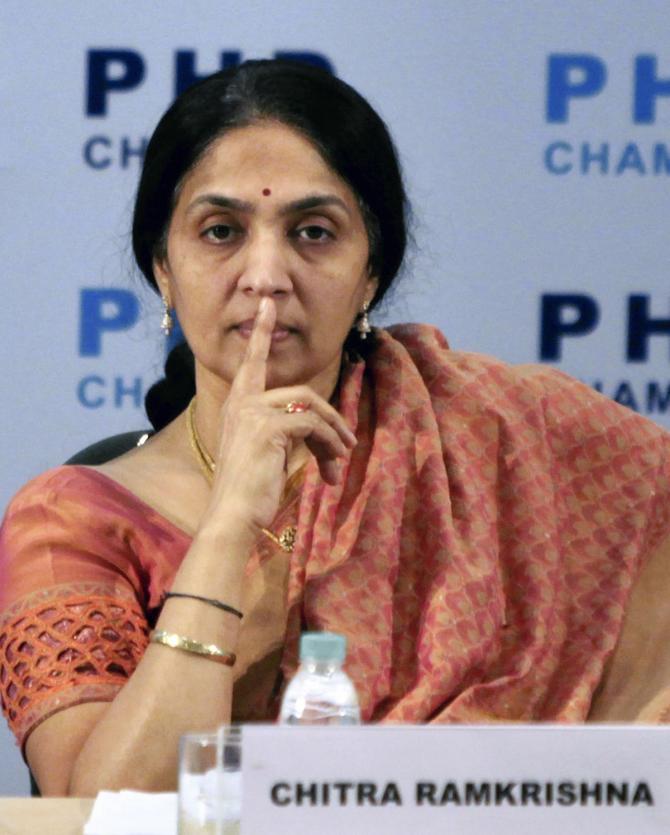'She violated NSE procedures and rules, corporate governance norms; Chitra acted maybe within her capacity as MD and CEO, but not in the right spirit.'

Former executive director of the Securities and Exchange Board of India J N Gupta, discusses the corporate governance issues, Sebi's role in taking action against Chitra Ramkrishna, the former CEO and MD of the National Stock Exchange, Anand Subramanian, who was appointed by Ramkrishna as NSE's chief strategy advisor and later group operating officer, and sharing of mails between Ramkrishna and an unknown yogi, who Chitra told Sebi, dwells in the Himalayas.
In the first part of an interview with Prasanna D Zore/Rediff.com, Gupta staunchly defends actions taken by Sebi against Ramkrishna and company.
A lot of questions are being asked about Sebi's inaction against Chitra Ramkrishna and Anand Subramanian? As a former Sebi executive director, how do you look at the entire episode?
I would ask you a counter question. First, tell me, what are the inactions?
That Sebi took a lot of time to call Chitra Ramakrishna and Anand Subramanian for questioning. And they are yet to find out who the yogi is.
The issue is not inaction; the issue is delay in action. Now, if I argue that action has two parts, one is immediate so as to ensure that there is no further problem at the (NSE and to the public interest) exchange and other is penalty for the actions taken by Chitra and Anand.
As far as action to ensure that nothing happens further removal of Chitra and Anand was done promptly. And I would say that you can't expect a regulator to look at things today and take action tomorrow; it takes time.
As far as removal action was concerned, there was no delay.
Now, let's talk about the Sebi order. This order is only for the penalty. Sebi plays multiple roles. And most importantly, Sebi ensured market integrity is not suffering. Sebi has only to fix the quantum of punishment now.
The major quantum of punishment (removal of Chitra and Anand) was already meted out; it is only the marginal or inconsequential penalty, which is delayed.
The second thing is who is this yogi? My question would be is this (finding the yogi's identity) important. Now, you are writing for Rediff.com, and if I ask you to include some point in the article that you are writing, then I am advising you. But it is your wisdom or discretion to follow my advice or ignore it.
If you follow my advice, which might turn out to be wrong, and if there are any consequences of that wrong, then the primary responsibility is yours because you acted on my advice.
The advice giver is never responsible unless the advice giver has a control over you.
Even if the advice giver (in this case, the yet unknown yogi) is harming the market the responsibility rests with you (Chitra Ramkrishna). You were put there by me (by the NSE board) to take care but you have failed in your duty.
When the finance minister consults people, and a lot of people give advice to the FM, and if the FM acts on someone's advice, and that creates problems, then will you catch hold of the FM or the person who gave advice?
It is the decision maker who should be held responsible.
As far as I am concerned, the advice-giver (the yogi) is insignificant.
Anybody could be the advice-giver, but was that person (the yogi) having control over you (Chitra)?
Now, consider a case where, instead of me, your editor asks you to amend a story you are writing. If you don't, then your editor will not carry your story (that is, your editor has control over you).
Unfortunately, in this case, you will be forced to include what the editor wants even though you may not agree.
So, only if this person (the yogi) who till now is a ghost should be a person of consequence in such a manner that he has control over the NSE. Only then will this yogi become important.
Has Sebi done enough to find out if this person has real existence or this person is just a ghost?
The problem is everybody in the media is writing stories without understanding things. Everybody is excited in this world about this issue, but I am not.
Sebi's priority is to ensure that whatever wrong happened was not allowed to continue and further wrong was not allowed to happen.
The first step was to remove Chitra and Anand and bring in a new board, bring changes and make systems more robust.
Nobody is asking what reforms NSE undertook to ensure such episodes don't happen again. Nobody is asking it. Nobody's bothered because asking this question is not the masala; the masala is who is the yogi.
The entire thing -- and remove the co-location issue (scam) -- is about the appointment of Anand Subramanian and Chitra Ramkrishna seeking advice (from the yogi).
Now, are any of the actions of Chitra, manifested through many of the e-mails, related to the trading system, margining system, risk management system, settlement system?
There is nothing to say (in the e-mails exchanged between Chitra and yogi) that could prove that these systems were compromised.
That makes the entire issue about appointment and remuneration to a person. There indeed is corporate governance failure (at the NSE).
Sharing of e-mails by Chitra with yogi and consequences of that has to be evaluated rationally.
Now, let's say if someone from the Indian Army tells a person in Pakistan who India's army chief is and where he resides, which is in the public domain. Will sharing this information be of any consequence? But if I share some maps or production plan of some ordnance factory then that has consequences.
Questions are being asked about Sebi's integrity too now. Has Sebi revealed all that was shared between this yogi and Chitra Ramkrishna in its order against Ramkrishna that is in the public domain now?
I'm again saying Sebi has taken a decision after going through the e-mails and come to the conclusion that this is the kind of crime Chitra committed.
So the problem is very simple. As I said, nobody in analysing this issue rationally. But everybody is writing a story with their own masala.
In your rational assessment and in the light of the final order made public by Sebi now, can a criminal case be made against Chitra Ramkrishna and Anand Subramanian?
I am not an expert at criminal law to reply to your question, but I would certainly say Chitra was wrong. She violated NSE procedures and rules, corporate governance norms; Chitra acted maybe within her capacity as MD and CEO, but not in the right spirit.
You can put all possible charges against her, but don't say that Sebi delayed any action. Sebi removed Chitra to prevent further damage (to the NSE).
I always like to give examples. If there is a fire in a building, then what should you do first? Find out the reason behind how the fire started or douse the fire and ensure safety of all the people in that building?
Once that is ensured, I would find out the cause of the fire and ensure that it does not happen in the future. Nobody's talking about what NSE did in the last six years (to ensure that people at the top do not breach corporate governance norms).
What people are asking is why you removed the person from service who caused the fire and did not penalise that person.
The immediate penalty was imposed in the form of removal and it is only that the monetary penalty has been imposed after six years.
Once you analyse it dispassionately, rationally, bit by bit, you won't find any problem (with Sebi's action against Chitra Ramkrishna and Anand Subramanian). You find a problem when you sail with the wind, without finding out the problem. People are writing all sort of crap.
Do you see any link between the co-location scam and Anand Subramanian's appointment as chief strategy advisor first and then group operating officer?
Again, I will have to send some mails to yogi to guide me on this. I don't have the data. I cannot comment on this.
Being a former Sebi ED, what's your sense? Is there more to this episode than meets the eye? Is there someone hiding information that would reveal more about yogi's identity or if sensitive information was shared by Chitra Ramkrishna with the yogi?
As a Sebi official I'd never be interested in who this yogi-bhogi, etc, is. I've already taken action based on what is there in the e-mail.










